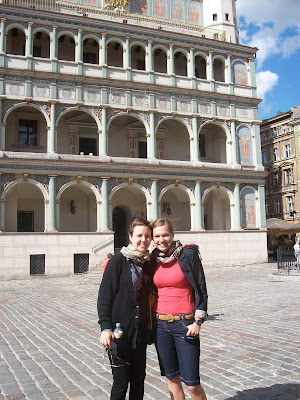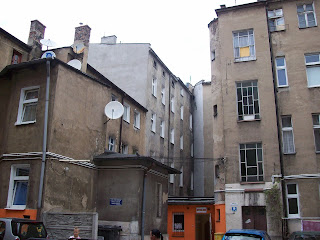 |
| Me (left) and Agata in the town square of Poznan |
She has just finished her Ph.D. in Sociolinguistics at the University of Edinburgh. I was thrilled to come visit her in her home town, Poznan, Poland, while she was on holiday there. I stayed with her family and enjoyed their hospitality (Poles are very hospitable!) while she mostly translated Polish-English so that I could talk to her parents. I even had the chance to learn a little bit of Polish and would love to learn more. Tak, tak! (Yes, yes!)
 |
| Agata in front of new Retro-Classical fountain (only a few years old) |
I learned that each off these little houses, repainted with special graphic style, were designed and built by a different builder. I wonder what they are like inside!
Here, Agata poses outside her favorite Cafe. One has to go through the building, through the cafe seating area, to come to the outdoor garden. This is similar to stuff I've seen in Germany. I think this is a common European way of building, but I didn't look closely at all the buildings I've seen in Europe. I know I saw similar back-gardens for pubs and cafes in Nottinghill, London.
In the US, I don't recall ever seeing a back-garden (Innenhof in German). In the US, we enjoy sitting in front of the cafe or inside, but behind it? ... Maybe this is the future for suburban cafes.
 |
| Brewery in the town Square |
 |
| Our honey beers- brewed on-spot! |
 |
| From atop a hill, looking down at the narrow streets. |

Above is a picture taken from the hill in front of the cathedral. I could see the town square from here.
The tower ahead is the top of the main building in the town square, which were in the first couple of pictures on this post.
And then we spotted a man running on top of the roof in front of us!! Agata told me that there is even a sport, in which the competitors race across rooftops! Losing must be fatal!
I love these roofs
At some point, we got hungry. Yes, we had our beer before lunch! Only in Europe. ;) We went to a Rustic-Polish restaurant, which features polish specialties. Guests enjoy their country-food in a rustic atmosphere. The chairs, tables, walls, decor, everything looked like the inside of a country home. |
| Appetizer: Bread with chive-creamcheese (left) or salted lard (!) with bitts of ham |
 |
| Country-Polish decor |
 |
| Our table looks like a bed! Notice the folk stitchwork on the comforter and pillow. |
 | |||
| Plate-buildings and look out of Agata's living room |
Renovating older pre-WWII building and building larger villa-style apartment buildings is coming back en vogue, I believe. It turns out that renovation of the Plate-buildings is costly and, besides that, it reminds many people of communism. In Germany, Plate-buildings are described in planning books as being more difficult to retrofit for other purposes (shops, industrial buildings, lofts, etc.), which makes the area resistant to the natural evolution of use that occurs in all city buildings.
I think it is important to understand the advantages and disadvantages of the built-environment. The Plate-buildings were built based on ideological principles, but how could I live with myself (if I were a developer or planner) if I devalued them based on some other ideology? The truth is that there is no point in regretting the way we built in the past, and there's no point to tear everything down and try to forget it didn't happen. I guess I fall into the category of urban thinkers who believe that a city can heal itself, if planning is democratic and constructive (not destructive). I found Agata's neighborhood very pleasant and green: green, a common good for everyone to use, even if under-utilized. I judge it to be better than suburbia, becuase the green is a shared good, like a park..
 |
| Green between Plate-building: soccer field to the right and elementary school to the left. |
 |
| Looking out of the balcony over the flowers |
Below are some pictures taken on our tour of the city. I forget exactly what the buildings are below. The picture on the left may be a police station.
 |
| Wall and building-needs renovation, but beautiful |
The picture above is of a red tower and the left side of the building in the previous picture. I believe that both buildings below to the university. The red building is the economics building. I never really like lonely towers, but the view must be nice from inside.
 |
| Retrofit brewery-now shopping and cultural center |
In any case, I was immensely impressed by the architecture of the building. The combination of red bick, glass and blue/purple steal reminded me of King's Cross Station in London, which is one of the most beautiful buildings I've ever seen, and is modern.
Yes, shopping malls exists in Europe too.
The above building contrasts very nice with the previous highly-modernized shopping mall. Agata and I came to this "Innenhof" or inner courtyard behind a building (remember the back-gardens?) in order to find a second-hand shop. It might have been there in the little orange building in the center. We didn't find it, or it had moved site, so we had to keep looking for other second-hand shops.
A cool thing about Poznan, or maybe all Polish cities, is that sometimes you see a door with little signage, and it turns out to be an underground one-room store. Agata took me to one of these in her neighborhood when we needed to get computer paper for printing. (No picture)
 |
| A mainstreet-only Ped-Zone |
I really liked the above museum's architecture. I like the clean facade, even if it is a bit flat. I guess that was 50's or 60's style. Old enough now, it must come back into fashion. I read in some book (can't remember which book now) that building are in the most danger of their whole life between 30-50's years after their construction. That is when they are old enough to be out of fashion, but too young to be consider old, and worthy. That is when most buildings get torn down.
Aren't cities fascinating! Thank you, Agata, for showing me your wonderful town. I will never forget our night out to the Ukranian folk-concert with bon-fires and our walk through the cobblestone streets. Our last bar was one to remember, with three stories of hidden courtyards and a free shot of Vodka on the house. I have made some wonderful memories. :)































Looks like you had a wonderful trip! It's great to see a new place when you have a native guide! Very interesting about the danger of a building being when it's 30-50 y.a. I don't think I ever really thought of that; however, now that you mention it, it seems so obvious. One of my favorite things about New Orleans and Santa Fe (Both being established by Europeans) are the small secluded gardens tucked into the buildings. It must be nice when living in such a populated place to get a bit of privacy and a break from the bustle of busier city parks and shared greens.
ReplyDelete